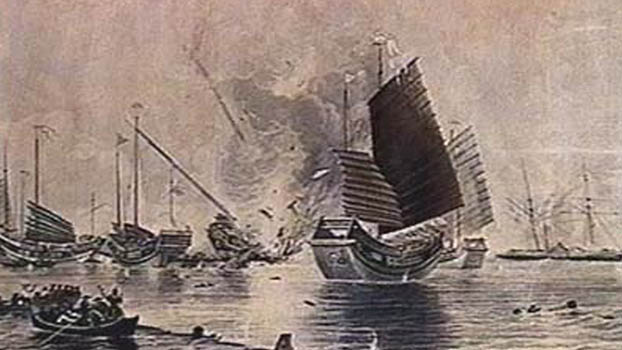This Day in History
Battle of Kowloon

In early July 1839 a group of British merchant sailors in Kowloon became intoxicated after consuming rice liqueur. Two of the sailors became agitated with and beat to death Lin Weixi, a villager from nearby Tsim Sha Tsui. Superintendent Elliot ordered the arrest of the two men, and paid compensation to Lin's family and village. However, he refused a request to turn the sailors over to Chinese authorities, fearing they would be killed in accordance with the Chinese legal code.
Commissioner Lin saw this as an obstruction of justice, and ordered the sailors to be handed over. Elliot instead held a trial for the accused men aboard a warship at sea, with himself serving as the judge and merchant captains serving as jurors. He invited the Qing authorities to observe and comment on the proceedings, but the offer was declined. The naval court convicted 5 sailors of assault and rioting, and sentenced them to fines along with hard labor in Britain (this verdict would later be overturned in British courts.)
Angered by the violation of China's sovereignty, Lin recalled Chinese laborers from Macau and issued an edict preventing the sale of food to the British. War Junks were deployed to the mouth of the Pearl River, while signs were placed and rumors spread by the Qing that they had poisoned the freshwater springs traditionally used to restock foreign merchant ships. On 23 August a ship belonging to a prominent opium merchant was attacked by lascar pirates while traveling downriver from Canton to Macau. Rumors spread among the British that it had been Chinese soldiers who had attacked the ship, and Elliot ordered all British ships to leave the coast of China by 24 August.
Early on 4 September Elliot dispatched an armed schooner and a cutter to Kowloon to buy provisions from Chinese peasants. The two ships approached three Chinese war junks in the harbor and requested permission to land men in order to procure supplies. The British were allowed through and basic necessities were provided to the British by Chinese sailors, but the Chinese commander inside Kowloon fort refused to allow the locals to trade with the British and confined the townspeople inside the settlement. The situation grew more intense as the day went on, and in the afternoon Elliot issued an ultimatum that, if the Chinese refused to allow the British to purchase supplies, they would be fired upon.
A 3:00 pm deadline set by Elliot passed and the British ships opened fire on the Chinese vessels. The junks returned fire, and Chinese gunners on land began to fire at the British ships. Nightfall ended the battle, and the Chinese junks withdrew, ending what would be known as the Battle of Kowloon. Many British officers wanted to launch a land attack on Kowloon fort the next day, but Elliot decided against it, stating that such an action would cause "great injury and irritation" to the town's inhabitants. After the skirmish, Elliot circulated a paper in Kowloon, reading;
The men of the English nation desire nothing but peace; but they cannot submit to be poisoned and starved. The Imperial cruizers they have no wish to molest or impede; but they must not prevent the people from selling. To deprive men of food is the act only of the unfriendly and hostile. —History




